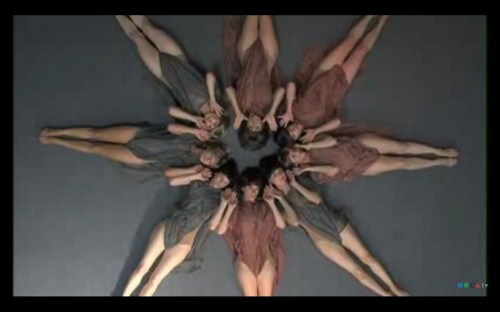Michelle Obama now has bangs. When you mention this to people who have seen photos or footage from last week’s inauguration, they tend to have opinions. Maybe they say, “I like the bangs.” Or, “They’re severe but they show guts.” Or, “Clearly, she doesn’t care what other people think.” Probably, it is because of the First Lady’s inauguration hair cut that I noticed so many bangs in the artwork I saw this week, at the Art Los Angeles Contemporary fair and elsewhere, and began to attribute certain significance to them.
It is also, probably, because I listened to last week’s Double X Gabfest—the Slate.com podcast where women whose loosely defined feminism is a point of pride—talk about “women’s issues” in pop culture and politics. Michelle’s bangs were their main topic. “Women are always either cutting their bangs or growing them out and it really does have something to do with identity,” observed Noreen Malone, who writes for the New Republic. Later, Slate editor Hannah Rosen wondered, “So, if we think of a woman who can own her own style in such a powerful way as a woman of substance—and you know this ties into the concept of British economist Catherine Hakim of erotic capital—this idea that women can now use their sexuality and charisma in a way that buys them value in the marketplace…Does that mean that a woman without a look is a weak woman?”
Of course, all the gabfesters hated that idea, as they should have. (It was a matter of seconds before they were discussing Hillary. Does she have “a look”? What about that bad dress she wore in 1997?). But in art you have more freedom to equate, or try to equate, looks and strength without sounding as stodgily reductive.
The women in Jim Shaw’s film The Whole have a look. This past weekend at the fair, Shaw’s film screened in a booth showcasing MOCAtv, the Museum of Contemporary Art Los Angeles’s newly launched YouTube channel, along with Shaw’s 2007 film The Hole, which features male zombie dancers moving through a smokey, black and white dream scape. The Whole, made two years later, features cultish female dancers instead of male ones (note the addition of the womanly “W” to the title), and they have bobs and bangs. They also appear in color. Some of them are brunettes and others blond. I suspect they’re wearing wigs, because their hair is so uniform. They seem to have nothing on under their flowing pink and purple tunics, and they dance in front of a fake tree and gray curtains, on carpet. The bangs, which are as precise as their movements and body lines, make them seem controlled—by someone or something we can’t see and also in possession of impeccable self-control.
There was another standout instance of bangs-in-art in the booth of Paris and NYC—based New Galerie. Paintings by the Paris collaborators We Are the Painters hung alongside sculptures by LA—based Lizzie Fitch. The paintings have washes of color that sometimes look like sunsets in the background. Affixed to the canvases are wooden cut-outs that look like women’s wigs with synthetic hair adhered to them. Just below the wooden wigs are scraps of cut fabric, arranged to look like shoulders. The paintings have no faces and the figure’s bangs are long—if it were real hair, it would be scraggy, Janis Joplin style. The same heavy-handed hair and scrappy, patterned cloth appeared in a photograph that hung above the gallerist’s temporary desk; this figure did have a face. It belonged to Lizzie Fitch, whose studio, We Are the Painters, used to make the paintings being shown. They had turned her into one of their paintings. In real life, Fitch often has blond wispy bangs, though the bangs imposed on her in the photograph were heavy, like some sort of Pharaoh-worthy headdress that would have weighed its wearers down. Because Fitch’s chin remains up under all that weight, she seems regal.
We Are The Painters. “Sans titre (Tiphanie),” 2012. Painted objects and synthetic hair on canvas mounted on wood panel; unique piece. Courtesy the artists and New Galerie.
The bangs of Brooklyn-based performance artist Narcissister, who appeared at Human Resources Los Angeles in Chinatown last Sunday, add to the regal, un-touchability that her signature Barbie mask already gives her. She does not have bangs in her Every Woman performance, a virtuosic one where she does a reverse strip tease, pulling her outfit out of her body’s orifices—a sheer halter, skirt, and scarf from between her legs, a pair of earrings and a belt from her mouth. For this she wears an afro wig, better for hiding shoes and a purse. However, she did sport bangs in part of an earlier performance called The Basket; and also in a video in which she pages through images of body builders before climbing onto an exercise bike with a butt plug sticking up off its seat. In both cases, Narcissister’s bob is a little shorter and lighter than those seen on Jim Shaw’s dancers but just as structured.
I remember reading a 1999 interview Vidal Sassoon gave the LA Times. The hairdresser (to whom Google Images attributes angled bangs galore) said, “When I first came into hair, women were coming in and you’d place a hat on their hair and you’d dress their hair around it.” In other words, the hair had to respond to other circumstances. “We learned to put discipline in the haircuts by using actual geometry,” Sassoon continues, “actual architectural shapes and bone structure. The cut had to be perfect and layered beautifully.” Isn’t it that same dream of perfection that’s prompted decades-worth of girls (and boys, I’m sure) to, on a night when everything else feels out of control, take scissors to their heads and cut what they hope will be a clean line of hair across their foreheads?
